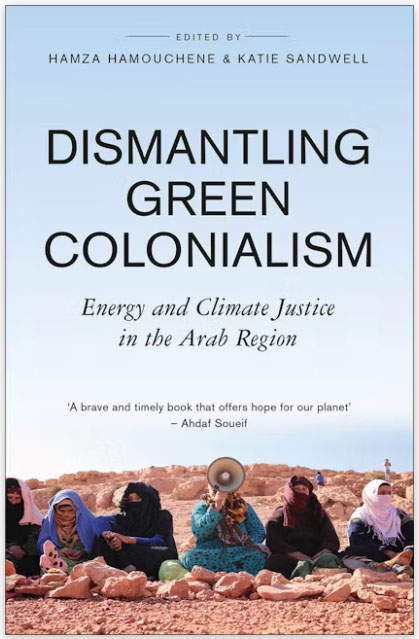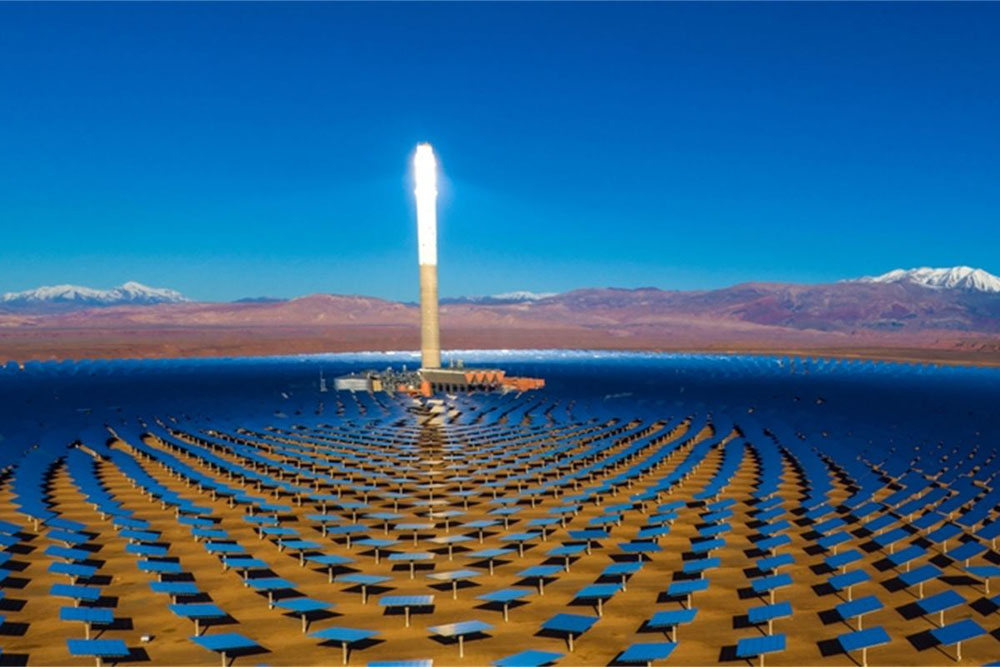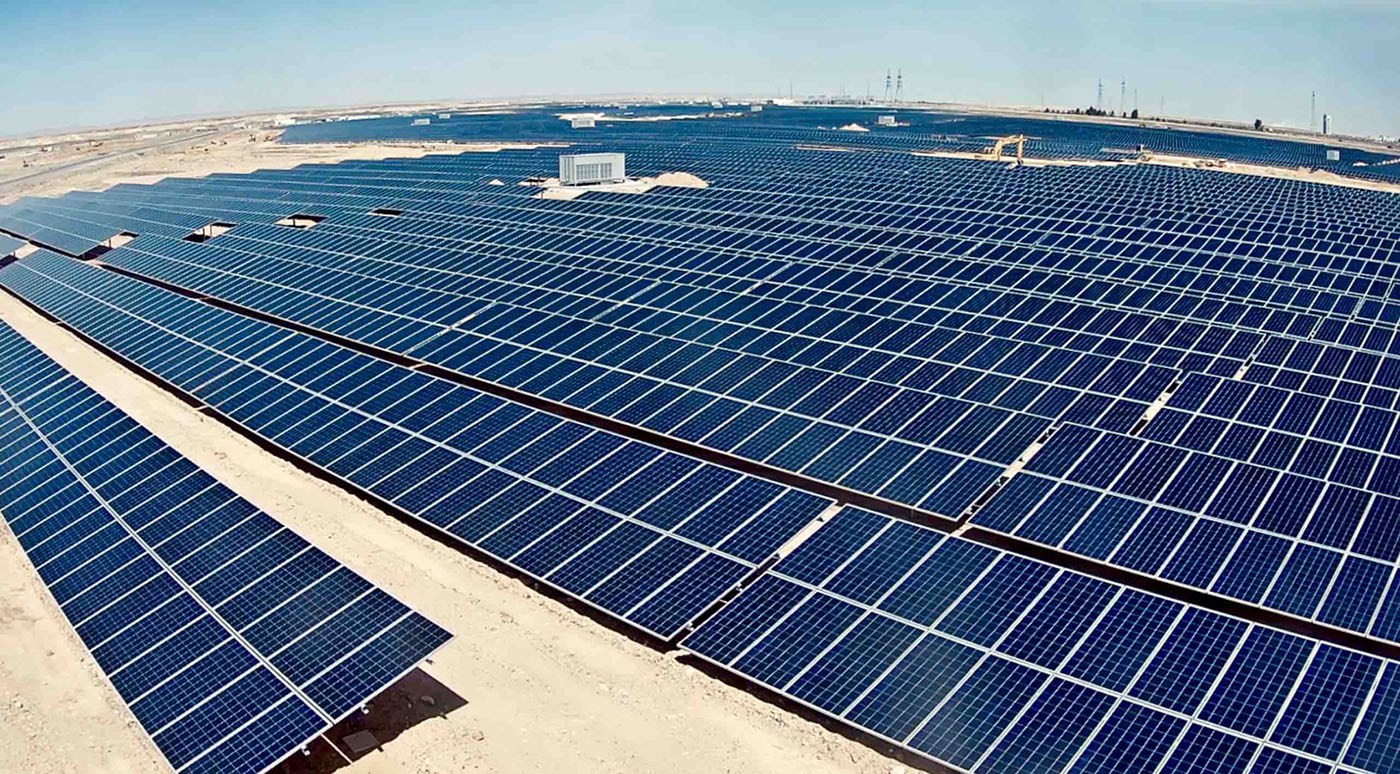The Middle East and North Africa are seen as fabled sources of renewable energy, as explained in an important, first-of-its-kind book. But amid alleged greenwashing and profiteering, an ethical strategy for the region to tackle climate change remains elusive.
Dismantling Green Colonialism: Energy and Climate Justice in the Arab Region
Edited by Hamza Hamouchene and Katie Sandwell
Pluto Press, 2023
ISBN 9780745349213
Richard Lim
How should we think about moves to cut global carbon dioxide emissions and switch to renewable energy, in the context of the Middle East and North Africa? That’s the focus of this timely, richly informative and, as you might guess from its title, idealistic and occasionally dogmatic collection of studies put together by the London-based Algerian activist Hamza Hamouchene and Katie Sandwell, both of whom are program coordinators at the 50-year-old progressive Transnational Institute think tank. Published just a couple of months before COP28, the most recent UN climate summit held in Dubai, the book has been provoking much discussion and, had it not been for Israel’s horrifying assault on Gaza, would arguably have gained even more attention among those of us with an interest in the region.

The stakes could not be higher, nor the themes more momentous. The MENA region clearly matters for decarbonizing the global economy, because it is both a massive producer of fossil fuels and boasts considerable green energy potential. Being a heat-vulnerable part of the world, decarbonization also matters to its inhabitants: if little is done, then by mid-century the region could experience heatwaves of “extraordinary duration, amplitude, and frequency” that “challenge human health and societies with profound impacts on livestock, agriculture, and biodiversity,” according to a 2021 study. At the same time, the region’s strategic importance means it is subject to the paralyzing influence of toxic factors such as vested interests, global and local inequalities, militarism and, as the compilers of this book would have it, green colonialism.
Hamouchene and Sandwell set out their stall with clarity and passion in the book’s introduction and in Hamouchene’s overview chapter on North Africa. They argue that the coming green transition must be judged not just by the extent to which the world manages to cut carbon dioxide emissions, but against criteria of climate justice. Although the concept remains somewhat nebulous, the editors note that the idea of a just transition is alluded to in the landmark Paris Climate Agreement of 2015, and insist that justice be viewed through the lenses of class, race, gender, labor and democracy.
The MENA region clearly matters for decarbonizing the global economy, because it is both a massive producer of fossil fuels and boasts considerable green energy potential.
Unfortunately for the MENA region, they say, the West’s attitude is one of environmental orientalism. Green grabbing is the name of the game, in which “land and resources are appropriated for purportedly environmental ends.” For example, the Sahara is seen as a vast, empty land ripe for development as a green energy generating platform to provide Europe, in particular, with ostensibly guilt-free electricity. “Even when sparsely populated,” the editors respond, “traditional landscapes and territories are embedded in cultures and communities, and people’s rights and sovereignty must be respected in any socio-ecological transformation.” And whatever the rich world gets up to, the book stresses the need to focus also on the antics of wealthy MENA oil-producing states that are practically a “sub-imperialist” force, intent on exploiting their poorer neighbours and subverting the green transition to their own ends.
So far, so plausible in a familiar left-leaning, anti-neoliberal kind of way, but this is more the stuff of the soapbox than a concrete program for action. Where the book shines is as a guided tour of the energy landscape in MENA nations and how those countries are addressing climate change while retaining a significant stake in energy production, whether that be through fossil fuels or as potential suppliers of renewables. The findings are enlightening, a much-needed compendium of questionable deals by politicians and members of wealthy elites (in some cases, they are one and the same).

Morocco is one of the most-analyzed places in the book, and seems to offer object lessons that apply to other MENA countries too. Historically reliant on imported fossil fuels for energy, Morocco has set some of the most ambitious renewable-energy targets in the region. Since 2021, it also boasts a billionaire prime minister, Aziz Akhannouch, whose family firm, Akwa, is an energy and construction conglomerate. The country hosts a major solar installation at Ouarzazate in the south, where a concentrated solar power (CSP) plant captures the sun’s rays, and plans to build a second near Midelt in the Atlas Mountains, where both CSP and solar panels are meant to be deployed. Under the auspices of the state renewables agency MASEN, these two public–private partnerships (PPPs) have been financed by loans from international development banks and agencies, with construction and operation undertaken by international consortia that include European and Middle Eastern companies such as France’s EDF Renewables, Saudi Arabia’s ACWA Group and the UAE’s Masdar, plus Green of Africa — a Moroccan joint venture in which Akhannouch’s Akwa is a partner.
Despite the emissions-cutting promise of these facilities, the book offers up a litany of criticism. For starters, why bet on CSP in the first place over much simpler solar-panel-based installations, which can be introduced at small scales throughout the country? CSP remains relatively unproven — indeed one chunk of the Ouarzazate plant is currently out of action because of a failure involving molten salt storage, and previous breakdowns there have reportedly stalled the Midelt project while MASEN frets over its CSP component. The book also makes the familiar argument that political bigwigs dislike a decentralized approach because it “forecloses the opportunities for capital accumulation” that megaprojects present. In other words, lining the state’s coffers and asserting the state’s authority seem to matter more than doing what’s best for ordinary people (such as supporting community-led projects). What’s more, CSP needs to siphon off water in an arid region for cooling purposes, and megaprojects never seem to include proper consultation over “long term rural development or relations between residents, the state and the private sector.” Even the economic case is contestable. Although renewables will cut Morocco’s hefty fuel bill, the country has had to take on more debt to get green megaprojects off the ground. In a final twist, it turns out that CSP electricity has cost more to generate than the contracted price at which Morocco’s electricity utility ONE buys it, but under ill-conceived PPP terms — and this is a mantra that crops up for several MENA countries covered in the book — private investors tend to be insulated from risks, with losses borne by the state and its citizens.
Unfortunately for the MENA region, they say, the West’s attitude is one of environmental orientalism. Green grabbing is the name of the game, in which “land and resources are appropriated for purportedly environmental ends.”
Another Moroccan renewables project is singled out as a case of outright green grabbing. Called Xlinks, it’s chaired by a former chief executive of the UK supermarket chain Tesco, and will entail a brand new solar and wind farm in southwest Morocco, on a site the size of Greater London. If built — investors are still being lined up and no clear target date for completion has been set, although the UK deems the scheme to be “of national significance” — then Xlinks will deliver 3.6 gigawatts of renewable power (about one-third of the plant’s output, and 8% of the UK’s electricity consumption) to the UK National Grid through a 4,000-kilometer undersea cable linking Morocco with Devon. Hamouchene deplores this and similar ventures involving Europe, arguing that North African countries should slash their own carbon emissions before “even starting to think about exporting” renewable energy.
It’s one of several doctrinaire positions in the book, rejecting the notion that land can be underutilized and therefore worth expropriating for the greater good. Take a contrary view, and the issue becomes one of unaccountable, ineffectual, and at worst kleptocratic Arab rulers who neither know how to negotiate sound deals to tap their countries’ green potential nor properly plough the proceeds of their deals back into public services and the communities affected by renewables projects.
Dismantling Green Colonialism is at its most persuasive and readable when the axe-grinding takes a back seat and the facts are left to speak for themselves. The chapter on Jordan, for instance, is exemplary. Forced to seek alternatives after the loss of Iraqi oil following the US invasion and, in the 2010s, faltering supplies of piped Egyptian gas, Jordan can now make the creditable boast that renewables supply a quarter of its electricity. Some 40% of this green energy actually comes from small-scale generation by firms or individuals, who can sell surplus power to the state. However, the book points out, Jordan’s room for maneuver remains constrained by geopolitical machinations. In 2016, it signed a deal to buy gas extracted by Israel from the disputed Leviathan field in the eastern Mediterranean, a contractual obligation that in effect makes it less attractive for Jordan to pursue green options. And in November 2022, on the back of the 2020 Abraham Accords, Jordan, Israel and the UAE agreed to pursue Project Prosperity, under which Israel will supply Jordan with desalinated water in return for all of the electricity from an offshore solar farm — to be conveniently located in Jordan and built by the UAE’s Masdar.
It’s questionable, as the book notes, whether such a deal would even be needed were it not for Israel’s hegemonic seizure of water resources, and the whole idea is in the doghouse for now, in the wake of Israel’s assault on Gaza. But it does bring us to the pernicious role of Saudi Arabia and the Gulf States in subverting global climate politics, for fossil-fuel producers want to have their cake and eat it too.
Several recent COPs have been hosted by oil states, as will the next one. It’s all about using “resources to launder the image of the oil-based economy,” the book points out, and more cynical observers now see these global summits as having been co-opted by the fossil-fuel lobby. Although decarbonizing should mean leaving fossil fuels in the ground, oil producers are clinging to business as usual, maximizing revenues while they belatedly switch to renewables at home, partly to fulfill their climate commitments and partly to become players in green technology, as exemplified by Masdar. What’s more, the West’s ability to push back on this greenwashing is fading, in part because its energy companies have been sidelined by homegrown Middle Eastern and Chinese firms, the latter winning oil contracts all over Iraq, for example; the book singles out an “axis of fossil capitalism” that now links the Middle East and East Asia, “constituting a sizeable barrier to any green transition.”
Technology is an ever-present thread in Dismantling Green Colonialism, but Hamouchene dismisses “technofixes” as perpetuating the world’s addiction to economic growth. It’s another maximalist position, one at odds with the importance scientists and engineers attach to sustainability, the ultimate goal being a green energy transition in tandem with a circular economy. While technology alone won’t get us there — political will to tame consumption, and innovations such as a universal basic income will be needed — we certainly won’t get there without technology, including technology transfer to the Global South. It’s also impossible to understand the MENA region’s energy intrigues without technology as a lens. For example, the book notes Europe’s enthusiasm to exploit hydrogen to meet its climate goals (and wean itself off Russian fossil fuels), and MENA countries are angling to be suppliers. The UAE, for one, is getting into green hydrogen, made by splitting water into hydrogen and oxygen using renewable energy, with Morocco hoping to follow suit — but the headache is where the water will come from in an arid region. The UAE and Egypt are also eyeing “blue” hydrogen, created by converting the methane in natural gas into hydrogen, because it would help legitimize their continued extraction of fossil fuels. Unfortunately, making it churns out carbon dioxide as a by-product — the very stuff the world is trying to eliminate — which must be locked away using unproven carbon capture and storage technology. Wherever technology is headed, work is constantly under way to reduce its ecological footprint, such as by enabling green-hydrogen plants to take up wastewater or even brine rather than scarce fresh water.
One unexpected thing that Dismantling Green Colonialism indirectly highlights is how the media routinely overlooks the issues it raises, preferring to obsess over politics and diplomacy. I’m reminded of a discussion, several years ago now, at which a seasoned BBC Middle East reporter was asked why there wasn’t more coverage of the Gulf countries or Saudi Arabia. His dismissive response was that he didn’t think they were all that interesting. This laudable book reminds us that revelations will emerge if you just follow the money.
Dismantling Green Colonialism: Energy and Climate Justice in the Arab Region is available as an open access download.





